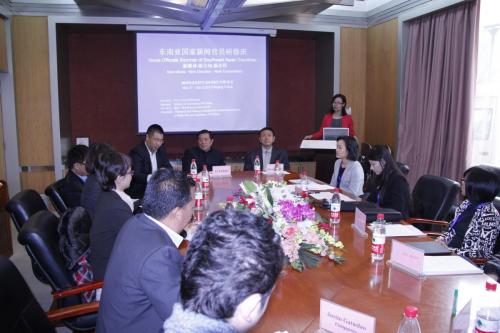Day 1 – Wednesday, 29th May, 1600 – 1730
Session 2: Dealing with Ethics: Are Existing Models Effective?
As audiences become more demanding and discriminating, broadcast organizations will need to pursue a healthier mechanism to deal with ethical complaints and violations. Existing models include state regulation, self-regulation and co-regulation. Are they still valid and effective? Are codes of ethics making sense to promote professionalism? Do we need a more robust organization to enforce media ethics? Is there a role for the state in a self-regulatory system? What is a better alternative?
Day 1 – Wednesday, 29th May, 1600 – 1730
Session 2: Dealing with Ethics: Are Existing Models Effective?
As audiences become more demanding and discriminating, broadcast organizations will need to pursue a healthier mechanism to deal with ethical complaints and violations. Existing models include state regulation, self-regulation and co-regulation. Are they still valid and effective? Are codes of ethics making sense to promote professionalism? Do we need a more robust organization to enforce media ethics? Is there a role for the state in a self-regulatory system? What is a better alternative?
 |
|
 |
Associate Prof. Martin Hadlow Secretary General, Asian Media Information and Communication Centre (AMIC), Singapore |
 |
|
 |
Dr. Venkat Iyer Barrister & Media Law Consultant, University of Ulster, United Kingdom |
 |
Ms. Moneeza Hashmi President, Commonwealth Broadcasting Association (CBA) and General Manager, HUM TV, Pakistan |
 |
Mr. Li Peichun Deputy Director, English Service, China Radio International (CRI), China |
 |
Mrs. Soondaree Devi Soborun Deputy Director General, Mauritius Broadcasting Corporation (MBC), Mauritius |
 |
Mr. Vorasack Pravongviengkham Deputy Director General, Lao National Radio (LNR), Laos |
AMS 2013 – Session 2
Day 1 - Wednesday, 29th May, 1600 - 1730
Session 2: Dealing with Ethics: Are Existing Models Effective?
As audiences become more demanding and discriminating, broadcast organizations will need to pursue a healthier mechanism to deal with ethical complaints and violations. Existing models include state regulation, self-regulation and co-regulation. Are they still valid and effective? Are codes of ethics making sense to promote professionalism? Do we need a more robust organization to enforce media ethics? Is there a role for the state in a self-regulatory system? What is a better alternative?
AMS 2013 – Parallel Session 2
Day 1 - Wednesday, 29th May, 1400 - 1530
Parallel Session 2: Media Literacy: Fulfilling Its Mandate
Initiatives on media literacy programs in order to gain critical autonomy relationship with all media in Asia-Pacific have been wanting. In some countries, media literacy in schools is subsumed in other subjects. Others emphasize acquiring production skills to help people understand, produce and negotiate meanings in a culture made up of powerful images, words and sounds. How can we promote and expand media literacy? Can we extend emphasis to other areas such as building an informed citizenship, aesthetic appreciation and expression, social advocacy, self-esteem, and consumer competence? What are some best media literacy practices?
AMS 2013 – Parallel Session 1
Day 1 - Wednesday, 29th May, 1400 - 1530
Parallel Session 1: Taking More Action for Sustainable Development: Can Media Help?
The recent United Nations Conference on Sustainable Development, more known as Rio+20 Earth Summit in 2012 has raised more concerns and expectations in dealing with an accelerating ecosystem degradation and increasing number of climate-induced extreme weather events. Compounding these problems are the global financial crisis, food and water scarcity, and volatile oil prices. As these multiple crises continue to become the dominant stories, can old and new media help build the capacity of a growing human population to live peacefully and sustainably on this planet?
Noted speakers make AMS 2013 a special gathering
AMS 2013 Day Two (30 May) continues with the fascinating
Stellar Lineup of Speakers at AMS 2013
AMS 2013 Day One (29 May) offers an impressive mix of speakers from a variety of backgrounds, be in the broadcast industry, academia, NGO’s and other international organizations. Join us in this select gathering as we deliberate and debate on the most pressing issues facing the world of broadcasting!
ASEAN Broadcasting Seminar in China
A seminar for broadcasters and media professionals from Southeast Asian countries was recently held in China, hosted by the State Administration of Radio, Film and Television (SARFT) and facilitated by AIBD. It was attended by 13 participants from Brunei, Cambodia, Indonesia, Philippines, Thailand and Vietnam.
AIBD/NBT In-country workshop on Creating Awareness on Green Living
AIBD together with the National Broadcasting Services of Thailand (NBT) oganised an in-country workshop on Creating Awareness on Green Living from 29 April to 02 May 2013 to train producers to deliver more quality content programming to create awareness on environmental degradation and the impact of climate change to communities through family-oriented programmes.
AMS 2013 – Session 1
Day 1 - Tuesday 24th May 2011, 1045 - 1215
Diversity makes a society richer, offering people a kaleidoscope of art forms, religious practices, and languages. It can make a country stronger and better in dealing with the new global economy. While new communication technologies offer more choices and opportunities for cultural expression and dialogue, these have also limited access and content sources as well as concentrated ownership, thus highlighting the need for more efforts to promote cultural diversity. How do we preserve concepts of identity and social bonds within communities and cultures while promoting local cultural expression and local languages? What role can public radio and television services play to address stereotypes and prejudices? How can we improve media coverage of cultural diversity? What are some best practices?
Exciting Lineup of Pre-Summit Events at AMS 2013
AIBD is pleased to join with its partners and supporting organizations in conducting five Pre-Summit workshops to be held prior to the main Asia Media Summit 2013 in Manado, Indonesia from 26-28 May.


